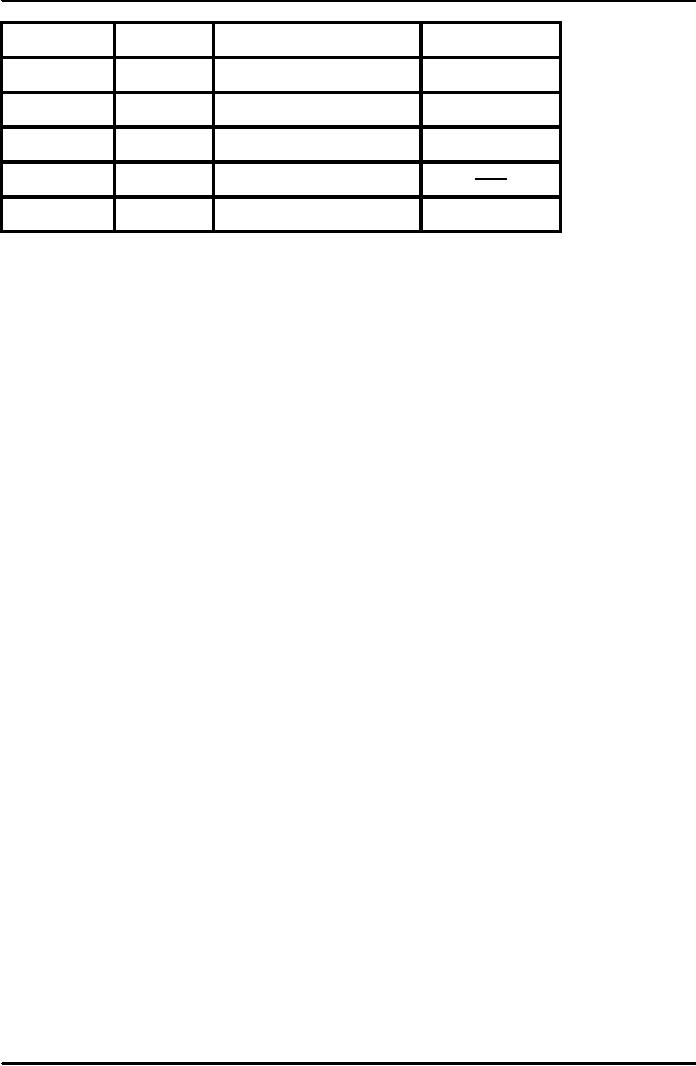 |

VU
Lesson
25
LETTER
WRITING
Collection
Letters
No
matter how carefully a company
chooses its credit customers,
there will be times when a
bill goes
unpaid
and steps to collect must be
taken. The problem when
writing a collection letter is
how to get
payment
and at the same time keep a
customer. The writer of a
collection letter wants to
get the money
owed
and maintain goodwill.
Collection
letters, therefore, should be persuasive
rather
than forceful, firm
rather
than demanding. A
fair
and
tactful letter gets better
results than a sarcastic or
abusive one. In fact,
collection letters should be
"you-
oriented";
courteous, considerate, and
concerned about the customer's best
interest.
The
purpose of collection letters
is:
1.
To get the money.
2.
To keep the customer and
future business.
3.
To build goodwill.
2.
The purpose of the collection
process is to maintain Goodwill while
collecting what is owed
3.
Collection is a sensitive
issue
4.
The following practices may
be avoided
1.
Falsely implying that a
lawsuit has been
filed
2.
Contact the debtor's employer or relatives about the
debt
3.
Communication to the other persons that
the person is in debt.
4.
Harassing the debtor
5.
Using abusive or observe
language
6.
Using defamatory language
7.
Intentionally causing mental
stress
8.
Threatening violence
9.
Communicating by postcard (not
confidential enough)
10.
Misrepresenting the legal status of the
debt
11.
Communicating in such a way as to make
the receiver physically
ill
12.
Misrepresenting the message as a government or court
document
13.
Communicating by postcard (not
confidential enough)
14.
Misrepresenting the legal status of the
debt
15.
Communicating in such a way as to make
the receiver physically
ill
16.
Misrepresenting the message as a government or court
document
Right
attitude for successful
collections
�
Any
emotional reaction on the part of the
debtor may reduce the
chances of recovery.
�
Successful
collection depends to on the following
factors
�
Understanding
of Human Nature
�
Knowledge
of collection policies and
laws
�
Using
persuasive / positive appeals
effectively
i)
Appeal to fairness &
justice
ii)
Appeal to pride
iii)
Appeal to Goodwill
iv)
Appeal to sympathy
Begin
with assumption that most
people will pay
�
Give
no impression that you doubt
the honesty of the debtor
�
Use
a courteous, reasonable tone
but become firmer
�
And
more demanding during the later
stages of the series
�
Remain
with the law, don't
harass
�
Show
understanding and flexibility while
writing delinquent
accounts
�
Send
collection notices quickly
and regularly
�
Never
imply in you messages that
payment can be avoid or
postponed.
�
Retain
goodwill throughout the
series
100

VU
�
Present
you evidence and stick to
the facts
�
Persuade
the debtors of the benefit he will
receive by paying
�
State
clearly the specific action the debtor
must take
Collection
Letter Series
Collection
letters are usually sent in
a series. The first is
mildest and most
understanding, with the
letters
getting gradually more insistent.
The final letter in this
series, when all efforts
have failed, threatens to
turn
the matter over to a lawyer or collection
agency or court of law. Of course, the
tone of any letter in
the
series
will vary, from positive
and mild to negative and
strong, depending upon the past
payment record of
the
particular customer. The intervals
between the letters may also
vary, from ten days to a
month at the
start,
from one to two weeks
later on.
Every
letter
in a collection series should contain
certain information.
1.
The amount owed;
2.
How long the bill is
overdue;
3.
A specific action the customer may
take.
Some
companies also like to include a SALES
APPEAL, even late in the
series, as an extra incentive
for
payment.
The
majority of bills are paid
within ten days of receipt,
with nearly all the rest
being paid within the
month.
Therefore, when a bill is a month
overdue, action is called for.
Still, the collection process
must
begin
gently.
Statement
of Account / Reminder
(The
1st Step)
The
monthly statement reminds the
customer of outstanding bills. If it is ignored, it should be
followed
(about
a week or ten days later) by a
second statement. The second
statement should contain a notice
(in
the
form of a rubber stamp or
sticker) stating "Past Due"
or "Please Remit". An alternative is to include
a
card
or slip with the statement, alerting the
customer to the overdue bill. The notice
could be phrased in
formal,
possibly even simple
language; it is an objective reminder that
does not embarrass the
customer with
too
early a personal
appeal:
Our
records indicate that the balance of
Rs. 4000/- on your account
is now past due. Payment is
requested.
(OR)
Our
records show that your
September payment is more
than a week over-due. If you
have recently
mailed
your cheque for Rs.1548700/- we
thank you. If not, please
send it in quickly.
Stage
2
If
the objective statement and reminder fail
to get results, the collection
process must gradually
become
more
emotional and personal. The
second collection message, however,
should still be friendly. It
should
seek
to excuse the unpaid bill as an
oversight; the tone should convey the
assumption that the
customer
intends
to pay. At this stage, too,
stress on future sales, rather
than on payment.
Consider
the following letter:
Dear
Mr. Bilal,
Enclosed
is a duplicate list of your credit
charges from December
200--. It is sent to you as
a
friendly
reminder that the balance on your
account with us is past due.
Please take a few minutes today
to
send
us your cheque for Rs.
224760.Use the postpaid addressed envelope
provided for your
use.
Yours
truly,
When
a credit customer does not
respond to personal reminder messages,
you can assume that
something is
preventing
the customer from paying. It
may be that the customer is unhappy
with the purchased
merchandise
or is facing financial difficulty.
Whatever the reason may be
for holding up payment, you
want
the
customer to (1) explain why the
payment hasn't been made or
(2) settle the
account.
101

VU
The
following letter illustrates the
approach generally used in
requesting an explanation:
Dear
Mr. Javed,
We
are concerned about your
overdue account. Several reminder notices
have been mailed to
you,
and
we expected to receive your
Rs. 38400/- cheque in the
mail. But so far we
haven't.
There
may be a circumstance beyond your
control that prevents you
from settling this account. If
so,
please
write me about it. I'm
certain we can work out a
payment arrangement after we know what
your
situation
is.
Just
think how good you
will feel, Mr. Javed,
when your account with us
has been paid in
full.
Yours
truly,
Appeal(s)
for Payment
Step
3
The
next collection message is an
appeal to the credit customer to pay.
This is a stern letter, but
calmly
written.
Typical appeals
are to the customer's pride or sense of
fair play.
Your
appeal for payment should
not threaten to take the debtor to
court unless you actually
plan to.
Give
the person another chance to save a
good credit standing by sending
payment before the deadline
usually
10 to 12 days from the date of the
letter. The following letter
is an example of a courteous
request
for
payment which appeals to
both the customer's pride
and his sense of fair
play.
This
letter should stress the customer's
self-interest by pointing out the
importance of prompt payment
and
the dangers of losing credit standing.
The letter should convey the
urgency and seriousness of
the
situation.
Dear
Mr. Naeem,
Your
good credit reputation enabled
you to purchase a Rs.
15000.00 suit from us over
three months
ago.
We were glad to place your
name on our credit list at
that time, and we made it
clear that accounts
are
due
on the 15th of the month following the
purchase. When you bought
the suit, you accepted those
terms.
Your
credit reputation is a valuable asset. We
want you to keep it that way
because of the advantages it
gives
you. You have enjoyed a liberal
extension of time, but to be fair to
our other customers, you
must pay
the
amount that is past due by
March 2.
Won't
you please send us your
check for the said amount
today?
Sincerely,
Dear
Mr. Naeem,
We
are truly at a loss. We cannot
understand why you still
have not cleared your
balance of Rs.
5000/-,
which is now three months
overdue.
Although
you have been a reliable
customer for 5 years, we are
afraid you are placing your
credit
standing
in jeopardy. Only you, by sending us a
check today, can ensure
your reputation and secure
the
continued
convenience of buying on credit.
We
would not like to lose a
valued friend, Mr. Naeem.
Please allow us to keep
serving you.
Sincerely,
Stage
4
Finally,
payment must be demanded.
The threat of legal action or the
intervention of a collection
agency
is sometimes all that will
induce a customer to pay. In
some companies; moreover, an
executive
other
than the credit manager signs this
last letter as a means of
impressing the customer with the
finality of
the
situation. Still, the fourth collection
letter should allow the customer
one last chance to pay
before steps
are
taken.
102

VU
Final
Collection Letter
Dear
Mr. Naeem,
Our
Collection Department has informed me of
their intention to file suit
as you have failed to
answer
any
of our requests for payment
of Rs.5000/-, which is now 4 months
overdue.
Before
taking this action, however, I would like
to make a personal appeal to
your sound business
judgment.
I feel certain that, if you telephone me,
we can devise some means to
settle this matter out
of
court.
Therefore,
I ask that you get in
touch with me by the 25th of the
month so that I may avoid
taking
steps
which neither of us would
like.
Truly
yours,
A
customer may, for example,
offer an excuse or promise
payment; he may make a
partial payment or
request
special arrangements. At this point, the
series would be
inappropriate.
For
instance, if your customer
has owed Rs. 6000/- on
account for two months and
sends you a
cheque
for Rs. 1500/-, you
may send a letter such as
the following:
Dear
Mr. Naeem,
Thank
you for your cheque
for Rs. 1500/-. The
balance remaining on your account is
now Rs. 4500/-
.
Since
you have requested an
extension, we offer you the
following payment plan: Rs.
1500/- by the
15th
of the month for the next
three months.
If
you have another plan in
mind, please telephone my office so
that we may discuss it.
Otherwise, we
will
expect your next cheque
for Rs. 1500/- on September
15.
Sincerely
yours,
First
Reminder after Monthly
Statement
Situation
On
February 3, Nursing Home
purchases supplies and equipment
from Medix. Hospital
Supply
Company
on thirty-day credit terms. Although the
nursing home has been in
operation only a short time,
the
information concerning the enterprise
has been favorable and credit
was granted. A regular
statement is
mailed
on March 10. When no
response is received by March
20, a second statement is
sent.
First
Reminder
MEDIX
HOSPITAL SUPPLY
COMPANY
CUSTOMERSTATEMENT
Nursing
Home
P.OBox888
Lahore
Please
send your cheque.
103

VU
Date
Invoice
#
Items
Amount
February
6
Y-200
Wheel
Chairs
6333
Walkers
2432
Hospital
garments
1800
Blood
Pressure units
2000
Total
Rs.12565
Second
Reminder
Situation
Nursing
Home makes no response to the
first reminder. Ten days later a
second reminder is sent.
Second
Reminder
This
is a copy of the regular statement on
which the following message
appears at the bottom:
Mr.
Jameel: To date, no payments have been received from
you, and we're curious to
know why? Perhaps it is merely
an
oversight.
If there are other reasons we should be
aware of, please let us
know. Otherwise, may we have your cheque
for
Rs.50000?
Third
Reminder
Situation
Nursing
Home still has not
responded to the previous reminders. A
third reminder is sent ten
days
after
the second one went
out.
Third
Reminder
This
is a copy of the regular statement on
which the following message appears at
the bottom:
Mr.
Jameel: Is there some reason we have not
heard from you? The amount
you owe us is now long past due
and is
beginning
to concern us. Don't you think we are
entitled to an explanation? Please let us
hear from you at once.
Fourth
Reminder-Telephone Call
Situation
The
Credit Manager at Medix
Hospital Supply Company has
heard nothing from Nursing
Home and,
on
April 3, decides to telephone the owner,
Mr. Jameel.
The
Telephone Call
When
the Credit Manager, reaches Mr.
Jameel he may start off
something like this:
"Hello,
Mr. Jameel. I'm Kamran at
Hospital Supply Company, and
I'm calling to ask about
your plans for
paying
your
account, which, as you know, is
now over 30 days past
due."
Jameel
is given an opportunity to tell his
side of the story (he has
just been so busy putting
the
nursing
home in operation that he
had to let some of his
paperwork slide.) At the end of the
conversation,
Jameel
promises to send his cheque
right away.
104

VU
Fifth
Reminder-Telegram
Situation
A
week has passed since the
credit manager spoke on the telephone
with Jameel, and no payment
has
been
received. She decides that
the next step is to send a
telegram.
The
Telegram
DURING
OUR TELEPHONE CONVERSATION ON
APRIL 3, YOU PROMISED
IMMEDIATE
PAYMENT OF YOUR ACCOUNT. YOUR
CHECK HAS NOT ARRIVED, AND IF
IT
IS
NOT ALREADY IN THE MAIL, I URGE YOU TO
SEND IT TODAY.
When
The Buyer Is At Fault
Dear
Mr. Faheem:
Your
balance with Murray's
Furniture Warehouse is 120
days past due. Our
efforts to collect from
you
by
mail, fax, and telephone have
been fruitless. You still
owe Rs. 50,000 of the
original Rs. 75000 in
purchases
you made on June 8. The
last check we received from
you was on August 8.
If
we do not receive a payment
within 10 days, your account
will be turned over to
Collection Agency
for
further handling.
Sincerely,
When
The Buyer Is At Fault
Dear
Mr. Rashid,
Despite
our numerous attempts by
letter, telephone, and numerous
onsite visits to your
restaurant to
collect
your past due balance,
you have neglected to make
any effort in making payments to
Florists. Your
restaurant
is now Rs. 5000 in arrears.
Having broken a series of
promises to pay, we cannot trust your
word
any
longer and must take more
serious action.
We
have turned your account
over to our collection
service. They are authorized to
use any and all
legal
means
deemed appropriate to collect your
payment.
Sincerely,
105
Table of Contents:
- COMMUNICATION:Definition of Communication, Communication & Global Market
- FLOW OF COMMUNICATION:Internal Communication, External Communication
- THEORIES OF COMMUNICATION:Electronic Theory, Rhetorical Theory
- THE PROCESS OF COMMUNICATION & MISCOMMUNICATION:Message
- BARRIERS IN EFFECTIVE COMMUNICATION /COMMUNICATION FALLOFF
- NON- VERBAL COMMUNICATION:Analysing Nonverbal Communication
- NON- VERBAL COMMUNICATION:Environmental Factors
- TRAITS OF GOOD COMMUNICATORS:Careful Creation of the Message
- PRINCIPLES OF BUSINESS COMMUNICATION:Clarity
- CORRECTNESS:Conciseness, Conciseness Checklist, Correct words
- CONSIDERATION:Completeness
- INTERCULTURAL COMMUNICATION
- INTERCULTURAL COMMUNICATION:Education, Law and Regulations, Economics
- INDIVIDUAL CULTURAL VARIABLES:Acceptable Dress, Manners
- PROCESS OF PREPARING EFFECTIVE BUSINESS MESSAGES
- Composing the Messages:THE APPEARANCE AND DESIGN OF BUSINESS MESSAGES
- THE APPEARANCE AND DESIGN OF BUSINESS MESSAGES:Punctuation Styles
- COMMUNICATING THROUGH TECHNOLOGY:Email Etiquette, Electronic Media
- BASIC ORGANIZATIONAL PLANS:Writing Goodwill Letters
- LETTER WRITING:Direct Requests, Inquiries and General Requests
- LETTER WRITING:Replies to Inquiries, Model Letters
- LETTER WRITING:Placing Orders, Give the Information in a Clear Format
- LETTER WRITING:Claim and Adjustment Requests, Warm, Courteous Close
- LETTER WRITING:When The Buyer Is At Fault, Writing Credit Letters
- LETTER WRITING:Collection Letters, Collection Letter Series
- LETTER WRITING:Sales Letters, Know your Buyer, Prepare a List of Buyers
- MEMORANDUM & CIRCULAR:Purpose of Memo, Tone of Memorandums
- MINUTES OF THE MEETING:Committee Members’ Roles, Producing the Minutes
- BUSINESS REPORTS:A Model Report, Definition, Purpose of report
- BUSINESS REPORTS:Main Features of the Report, INTRODUCTION
- BUSINESS REPORTS:Prefatory Parts, Place of Title Page Items
- MARKET REPORTS:Classification of Markets, Wholesale Market
- JOB SEARCH AND EMPLOYMENT:Planning Your Career
- RESUME WRITING:The Chronological Resume, The Combination Resume
- RESUME & APPLICATION LETTER:Personal Details, Two Types of Job Letters
- JOB INQUIRY LETTER AND INTERVIEW:Understanding the Interview Process
- PROCESS OF PREPARING THE INTERVIEW:Planning for a Successful Interview
- ORAL PRESENTATION:Planning Oral Presentation, To Motivate
- ORAL PRESENTATION:Overcoming anxiety, Body Language
- LANGUAGE PRACTICE AND NEGOTIATION SKILLS:Psychological barriers
- NEGOTIATION AND LISTENING:Gather information that helps you
- THESIS WRITING AND PRESENTATION:Write down your ideas
- THESIS WRITING AND PRESENTATION:Sections of a Thesis (Format)
- RESEARCH METHODOLOGY:Studies Primarily Qualitative in Nature
- RESEARCH METHODOLOGY:Basic Rules, Basic Form, Basic Format for Books